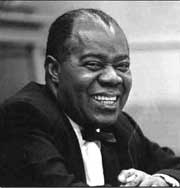You should read What A Wonderful Wasted World by John Gleeson for the Winnipeg Sun

…That’s where a little history can help — in the form of a jazz story.Something to let Grandma know that Reefer Madness is really Hello, Dolly.That, yes, Satch was a viper, and his wonderful world was wasted, but it was wonderful all the same.In the years after the Second World War, Louis Armstrong was bigger than popes or presidents.æ More than a jazz legend, he was the world’s most beloved entertainer — a symbol to war-ravaged Europe of America’s goodness, courage and indomitable cool.No wonder that at the height of the Cold War the U.S.æ State Department tried repeatedly to send Armstrong and his All Stars to the Soviet Union to play; he was such an American turn-on.He was also a daily marijuana smoker from about age 27 until his death in July 1971, one month short of his 70th birthday.“We always looked at pot as a sort of medicine, a cheap drunk and with much better thoughts than one that’s full of liquor,” Armstrong told biographer Max Jones in his last years, when he decided to “tell it like it wuz.”Armstrong, of course, couldn’t tell it exactly like it wuz.æ He had to deny he was a present user, but he was unequivocal in his praise of “gage,” as he called marijuana.“We did call ourselves vipers, which could have been anybody from all walks of life that smoked and respected gage,” Armstrong said.æ “One reason we appreciated pot, as y’all calls it now, was the warmth it always brought forth from the other person.“If we all get as old as Methuselah our memories will always be of lots of beauty and warmth from gage.æ Well, that was my life, and I don’t feel ashamed at all.æ The respect for it will stay with me forever.æ I have every reason to say these words and am proud to say them.æ From experience.”Armstrong’s experience with marijuana warrants public exposure, because it counters so many clinical stereotypes.
Read the article for more about this extraordinary life. The article concludes:
You can say Armstrong did it to feel good — call it recreational if you like.Or you can point to the unimaginable poverty of his childhood, the racism of his time, and say he used it as a crutch to take the edge off life’s pain.You can risk ridicule and say he did it because it helped connect him to the truth as a man and an artist.You can definitely say it’s too bad he smoked so much — he died of heart failure and, like the late Israel Asper, might have lived on for another decade if he didn’t smoke like a chimney.But no one can say the mature Armstrong should have been denied his daily muggles — any more than you could deny Asper his daily packs.They came and went in clouds of smoke.End of jazz story.

